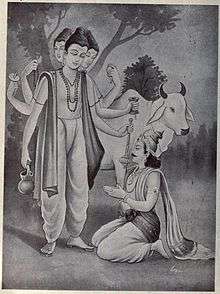Kartavirya Arjuna
| Kartavirya Arjuna | |
|---|---|
 Dattatreya gives boon to Arjuna |
Kartavirya Arjuna (Sanskrit: कार्तवीर्य अर्जुन, Kārtavīrya Arjuna; also known as Sahasrabahu Arjuna) was a legendary king of an ancient Haihayas kingdom with capital at Mahishmati which is on the banks of Narmada River in the current state of Madhya Pradesh. Kartavirya was son of Kritavirya, king of the Haihayas. This is his patronymic, by which he is best known; his is also referred to simply as Arjuna. He is described as having a thousand hands and a great devotee of god Dattatreya. On of the several such accounts states that Kartavirya Arjuna conquered Mahishmati city from Karkotaka Naga, a Naga chief and made it his fortress-capital.[1]
Arjuna Kartavirya is not to be confused with Arjuna Pandava, another major character in the Mahabharata.[2]
Encounter with Ravana

Kartavirya's power is popularly told in the Ramayana. He was the contemporary of Ravana. The story goes that once when Kartavirya Arjuna was having a bath in the river Narmada along with his wives, he stopped the force of the river with his thousand arms from both the sides. The teenage Dasagriva (Ravana), who was singing the hymns of Shiva and praying to him, made him lose his concentration. Enraged, he challenged the former for a combat. Ravana was defeated and was put to humiliation.Then on request of his paternal grandfather Pulastya the great emperor Kartaviryarjuna released Ravana.
Another account states that when Ravana came "in the course of his campaign of conquest to Mahishmati (the capital of Kartavirya), he was captured without difficulty, and was confined like a wild beast in a corner of his city."
The Vayu Purana states that Kartavirya invaded Lanka, and there took Ravana as prisoner, but later he was killed by Parashurama and Ravana was rescued from Karthavirya.[3]
Encounter with Parashurama

In the Mahabharata Vana Parva, according to the story of Akritavana, Kartavirya Arjuna became drunk with power, despite all the boons he had acquired. He lost control of his senses and began to oppress humans, Yakshas and the very gods themselves. Kartavirya even had the audacity to insult Indra in front of Sachi. Around this time, other Kshatriyas too had become drunk with power and oppressed innocents for pleasure.
Kartavirya once troubled Varuna and asked him if there was anyone equal to him in power. Varuna replied that only Jamadagni's son, Parashurama rivalled Kartavirya. Enraged, Kartavirya went to Jamadagni's hermitage to see Parashurama's prowess.
The Puranas recount that Kartavirya Arjuna and his army visited a rishi named Jamadagni, who fed his guest and the whole army with offerings from his divine cow Kamadhenu. The king demanded the cow for the betterment of his subjects; Jamadagni refused because he needed the cow for his religious ceremonies. King Kartavirya Arjuna sent his soldiers to take the cow. As the conflict developed among the Jamadagni and the King, Kartavirya Arjuna lost his cool and chopped off the head of Jamadagni. When Parashurama (Jamadagni's son and one of the Daśāvatāras of Vishnu) returned to the hermitage, he was informed of the context by his mother. In revenge, Parashurama killed the entire clan of Kartavirya Arjuna and the King with a battleaxe given to him by Shiva, thus conquering the entire earth, which he gave to Brahamanas.
In another legend, Kartavirya Arjuna visited the hermitage of Jamadagni, and was received by that sage's wife Renuka with all respect; but he made an ill return for her hospitality, and carried off by violence "the calf of the milch-cow of the sacred oblation." For this outrage Parashurama cut off his thousand arms and killed him.
In another legend, Kartavirya sent seventeen Akshauhinis to fight against the lone Parashurama who was on foot. The Brahmana single handedly slew the entire army and spared no one alive. Kartavirya arrived in his divine golden chariot which could go anywhere unobstructed. The King himself was a powerful archer, capable of simultaneously wielding five hundred bows and shooting five hundred arrows at a time. Parashurama broke Kartavirya's bows, slew his horses and charioteer and destroyed the chariot itself with his arrows.
Kartavirya hurled many weapons, rocks and trees at Parashurama, but the sage parried all these. Parashurama hacked off his thousand arms with his arrows and dismembered him with his axe.
In another place a different character is given to him, and more in accordance with his behavior at Jamadagni's hut. "He oppressed both men and gods," so that the latter appealed to Vishnu for succor. That God then came down to the earth as Parashurama for the special purpose of killing him.[4]
References
- ↑ Pargiter, F.E. (1972) [1922]. Ancient Indian Historical Tradition, Delhi: Motilal Banarsidass, p.265-7
- ↑ Lynn Thomas (2014). Julia Leslie, ed. Myth and Mythmaking: Continuous Evolution in Indian Tradition. Routledge. pp. 64–66 with footnotes. ISBN 978-1-136-77881-0.
- ↑ Dowson, John (1984). A Classical Dictionary of Hindu Mythology, and Religion, Geography, History. Calcutta: Rupa & Co. pp. 151–2.
- ↑ Gopal, Madan (1990). K.S. Gautam, ed. India through the ages. Publication Division, Ministry of Information and Broadcasting, Government of India. p. 74.
